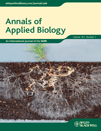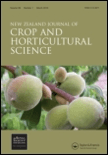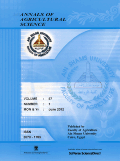
ANNALS OF APPLIED BIOLOGY
Scope & Guideline
Advancing agricultural science for a sustainable future.
Introduction
Aims and Scopes
- Plant Health and Pathology:
Investigating plant diseases, their management, and resistance mechanisms, contributing to improved crop resilience and sustainable agricultural practices. - Pest Management Strategies:
Exploring integrated pest management techniques, including biological control, chemical application, and ecological approaches to reduce pest populations while maintaining environmental health. - Crop Physiology and Genetics:
Researching the physiological responses of crops to various environmental stresses, focusing on genetic traits that enhance productivity and resilience. - Soil and Environmental Interactions:
Assessing soil health, microbial communities, and their interactions with plant systems, aiming to promote sustainable agricultural practices and ecosystem services. - Biodiversity and Ecosystem Services:
Studying the role of biodiversity in agricultural systems, including the impact of various farming practices on ecosystem services such as pollination and soil fertility.
Trending and Emerging
- Climate Change Resilience:
Increasing research on how climate change affects plant physiology and pest dynamics, emphasizing the need for adaptive strategies in agriculture. - Biological Control and Eco-friendly Practices:
A significant rise in studies focused on biological control agents and environmentally friendly practices, aligning with global sustainability goals. - Molecular Techniques in Plant Research:
Emerging trends in applying molecular biology techniques for disease detection, genetic mapping, and enhancing crop traits are becoming more prevalent. - Interdisciplinary Approaches:
A growing trend towards interdisciplinary research that combines agronomy, ecology, and technology to address complex agricultural challenges. - Phenological Studies and Climate Interactions:
Increased focus on phenological studies, particularly how climate variables affect growth stages and agricultural productivity, indicating a shift towards integrating phenology with climate science.
Declining or Waning
- Traditional Chemical Pest Control:
There has been a noticeable reduction in studies solely focused on chemical pesticide applications, reflecting a broader trend towards integrated and ecological pest management strategies. - General Crop Management Practices:
Research centered on generic crop management practices without a strong biological or ecological component seems to be declining, as the journal emphasizes more specialized and innovative approaches. - Basic Plant Morphology Studies:
There is a waning interest in purely descriptive studies of plant morphology, as the journal shifts towards research that connects morphology with physiological and ecological implications.
Similar Journals

Revista Brasileira de Ciencias Agrarias-Agraria
Illuminating the path for future agricultural advancements.Revista Brasileira de Ciencias Agrarias-Agraria is an esteemed academic journal published by the Universidade Federal Rural de Pernambuco, dedicated to advancing the field of agricultural and biological sciences. With a focus on disseminating high-quality research, this journal plays a pivotal role in fostering knowledge exchange within the agricultural community, particularly in Brazil and beyond. As a Q3 ranked publication in the Agricultural and Biological Sciences category, Revista Brasileira de Ciencias Agrarias-Agraria contributes to the growing body of literature by featuring insightful articles from both emerging and established researchers in the field. The journal has been consistently published since 2011 and is committed to open access principles, ensuring that research findings are accessible to a wide audience. Researchers, professionals, and students will find this journal an invaluable resource for deepening their understanding of current trends and innovations in agriculture.

PHYTOPROTECTION
Exploring New Frontiers in Pest ManagementPHYTOPROTECTION is a distinguished academic journal dedicated to the field of plant protection, published by the Quebec Society for the Protection of Plants. With an ISSN of 0031-9511 and an E-ISSN of 1710-1603, it serves as a platform for researchers, professionals, and students focused on the latest advances in plant protection methodologies, pest management, and sustainable agricultural practices. Although the journal's coverage in Scopus has been discontinued since 2010, its past publications encompass a wealth of valuable research from 1993 to 1994 and from 1996 to 2010, making it a crucial resource for those investigating plant health. The journal firmly positions itself as a fundamental contribution to the advancement of agricultural science, emphasizing research that addresses both contemporary challenges and future trends in the protection of plant resources.

Romanian Agricultural Research
Advancing Agricultural Science for a Sustainable FutureRomanian Agricultural Research is a prominent academic journal dedicated to advancing the field of agricultural science with a specific focus on agronomy and crop management. Published by the NATL AGRICULTURAL RESEARCH & DEVELOPMENT INST in Romania, this journal has established itself as an important resource within its discipline, evidenced by its Q3 ranking in the Agronomy and Crop Science category for 2023. With its ongoing publication since 2008, the journal provides a platform for researchers and professionals to disseminate their findings and share innovative practices that address the challenges faced in agricultural development. Although it operates under a non-open access model, Romanian Agricultural Research commits to rigorous peer-review processes, ensuring the high-quality content that enhances the academic community’s knowledge base. The journal's objective is to foster dialogues surrounding sustainable agriculture, improve crop yield, and contribute to the enhancement of agricultural practices globally. Researchers, professionals, and students will find this journal to be an invaluable repository of knowledge and a catalyst for future agricultural innovations.

Legume Research
Nurturing Research for Food Security and Ecological BalanceLegume Research, published by the AGRICULTURAL RESEARCH COMMUNICATION CENTRE in India, is an essential peer-reviewed journal focusing on advancements in the field of agronomy, crop science, soil science, and plant science. With an ISSN of 0250-5371 and operating since 2008, this journal caters to researchers, agricultural professionals, and students interested in the critical role of legumes in sustainable agriculture and food security. It ranks within the third quartile (Q3) in several prominent categories, reflecting its contribution to the agricultural and biological sciences community—ranking #279 in Agronomy and Crop Science, #113 in Soil Science, and #376 in Plant Science based on Scopus metrics. Although not open access, Legume Research remains a vital resource for those seeking to enhance their knowledge and contribute novel research findings in the ever-evolving discipline of legume cultivation and utilization. With a clear objective to disseminate impactful research, this journal significantly contributes to the global understanding of legumes' ecological, economic, and nutritional importance.

Zemdirbyste-Agriculture
Bridging research and practice in the heart of Lithuania.Zemdirbyste-Agriculture is a prominent journal dedicated to advancing the field of agricultural sciences, with a particular focus on agronomy and crop science. Published by the Lithuanian Research Centre Agriculture & Forestry, this open access journal has been fostering knowledge sharing and scientific discourse since 2004, allowing researchers, professionals, and students unrestricted access to its content. Located in the beautiful country of Lithuania, specifically at Vytautas Magnus University, this journal plays a significant role in disseminating innovative research findings. With a 2023 Scopus ranking of #246 out of 406 in the category of Agricultural and Biological Sciences, Zemdirbyste-Agriculture falls within the Q3 quartile, reflecting its growing influence in the academic community. This journal, which has converged its publication focus from 2008 to 2023, aims to provide a platform for scientists to share their critical insights on agricultural practices, sustainability, and technological advancements in crop science, thereby contributing to the global discourse on food security and environmental health.

Bioagro
Fostering collaboration for transformative agricultural practices.Bioagro is an esteemed academic journal dedicated to advancing research in the field of Agricultural and Biological Sciences. Published by the University Centroccidental Lisandro Alvarado in Venezuela, this journal has made significant strides since its inception in 2008, with a focus on delivering high-quality research publications that address contemporary challenges in agriculture and biology. Recognized for its contributions, it holds a Q3 ranking in the Agricultural and Biological Sciences (miscellaneous) category as of 2023, and it ranks #125 out of 221 in its field, placing it in the 43rd percentile. Although it operates on an Open Access model, Bioagro strives to provide broad access to innovative research, thereby fostering collaboration and knowledge dissemination among researchers, professionals, and students. With a commitment to include a wide range of topics, the journal aims to be a pivotal platform for exploration and dialogue in agricultural sciences, ensuring that key findings reach both scientific and practitioner audiences. Located in Barquisimeto-Cabudare, Lara, Venezuela, Bioagro invites submissions that contribute to the global discourse on sustainable practices and innovations in agriculture.

NEW ZEALAND JOURNAL OF CROP AND HORTICULTURAL SCIENCE
Exploring Innovations in Agronomy and HorticultureThe New Zealand Journal of Crop and Horticultural Science, published by Taylor & Francis Ltd, stands as a key resource in the fields of Agronomy and Horticulture, with a commendable impact factor reflecting its quality and influence in the scientific community. Since its inception in 1989, this journal has been committed to advancing our understanding of crop development and horticultural practices, catering not only to researchers and professionals but also to students eager to delve into the intricacies of plant sciences. With a Q3 ranking in both Agronomy and Crop Science and Horticulture as of 2023, the journal occupies a significant position within the agricultural and biological sciences domain, significantly contributing to the body of knowledge in these fields. The journal features original research, reviews, and technical notes that cover a wide range of topics, ensuring a comprehensive perspective on contemporary and emerging agricultural issues. For individuals interested in accessing cutting-edge research, the journal provides subscription-based access, further enhancing its scholarly contributions.

ANNALS OF AGRICULTURAL SCIENCES
Connecting Research and Practice for Global Agricultural AdvancementANNALS OF AGRICULTURAL SCIENCES, published by Elsevier, stands as a leading open access journal dedicated to the multifaceted field of agricultural sciences. Since its inception in 2011, this journal has served as a pivotal platform for the dissemination of high-quality research, covering areas such as agronomy, animal science, horticulture, food science, plant science, and soil science. With an impressive Q1 ranking across multiple disciplines and notable positions in Scopus Ranks—including #6 in Animal Science and Zoology and #3 in Horticulture—this journal is recognized globally for its significant contribution to advancing agricultural innovations. The journal caters to a diverse audience of researchers, professionals, and students, providing them with open access to cutting-edge studies that address critical issues in agricultural productivity and sustainability. Its commitment to high-impact research ensures that articles contribute meaningfully to the scientific community, fostering advancements in agricultural practices and policies.

Revista de Agricultura Neotropical
Bridging Research and Practice in Neotropical FarmingRevista de Agricultura Neotropical, published by UNIV ESTADUAL MATO GROSSO SUL, serves as a pivotal platform for disseminating research in the fields of agronomy and crop science. Since its inception as an open-access journal in 2014, it has been dedicated to promoting innovative research and practical applications within the agricultural sector, specifically tailored to the challenges and dynamics of the tropical agriculture landscape in Brazil and beyond. Although currently positioned in the Q4 quartile of Scopus rankings, and with a modest agricultural science percentile, the journal actively encourages contributions that highlight sustainable agricultural practices, tropical crop management, and emerging technologies in farming. With its commitment to open access, the Revista de Agricultura Neotropical broadens the reach of critical knowledge, making it accessible to researchers, professionals, and students alike, thus fostering a collaborative environment for advancing agri-scientific initiatives.

Revista Fitotecnia Mexicana
Fostering Local Ideas in Global Agricultural ContextsRevista Fitotecnia Mexicana is a prominent academic journal published by the SOC MEXICANA FITOGENETICA, dedicated to advancing knowledge in the fields of agronomy, crop science, genetics, horticulture, and plant science. With its establishment dating back to 2007 and currently running through 2024, this journal serves as an important platform for researchers, professionals, and academic institutions interested in plant genetic resources and agricultural innovations. Although it holds a Q4 quartile ranking in various categories and is positioned within the lower percentiles in Scopus rankings, it provides crucial insights and opportunities for emerging ideas and local research initiatives. Based in Mexico, and with its indexed ISSN 0187-7380, the journal plays an important role in stemming from the rich agricultural heritage of the region. The lack of open access options underscores the depth of curated content provided, making it a valuable resource for professionals seeking to expand their expertise in the sector.